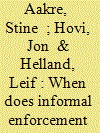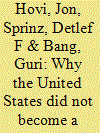|
|
|
Sort Order |
|
|
|
Items / Page
|
|
|
|
|
|
|
| Srl | Item |
| 1 |
ID:
080166


|
|
|
|
|
| Publication |
2007.
|
| Summary/Abstract |
To enhance effective cooperation, the Marrakesh Accords provide a compliance system for the international climate regime. An innovative part of this system is an Enforcement Branch authorised to apply punitive consequences against countries that fail to comply with their Kyoto obligations. While previous research has primarily focused on the ability of this compliance system to deter non-compliance, this article discusses whether the actual use of punitive consequences will induce a non-compliant country to return to compliance. The Marrakesh Accords explicitly emphasise that the punitive consequences shall be aimed at the restoration of compliance. However, we show that the application of punitive consequences will accomplish this in only exceptional circumstances
|
|
|
|
|
|
|
|
|
|
|
|
|
|
|
|
| 2 |
ID:
047639


|
|
|
|
|
| Publication |
London, Pinter, 1998.
|
| Description |
viii, 152p.
|
| Standard Number |
1855674882
|
|
|
|
|
|
|
|
|
|
|
|
Copies: C:1/I:0,R:0,Q:0
Circulation
| Accession# | Call# | Current Location | Status | Policy | Location |
| 043658 | 327.101/HOV 043658 | Main | On Shelf | General | |
|
|
|
|
| 3 |
ID:
117451


|
|
|
|
|
| Publication |
2012.
|
| Summary/Abstract |
Enforcement of agreements can be a major challenge in international politics. However, the interest in mechanisms of self-enforcement seems significantly lower among scholars studying international peace agreements (IPAs) than among scholars studying international environmental agreements (IEAs). Moreover, practically no exchange of ideas and findings about enforcement can be found between these two fields of research. We argue that a combination of similarities and differences between the two issue-areas provides fertile ground for mutual learning. To facilitate communication we develop a unifying but differentiated definition of self-enforcing agreements (SEAs). We then use this conceptual framework to explore lessons about IEA design that might be learned by studying IPAs and lessons about IPA design that might be learned by studying IEAs. We submit that this kind of compare-and-contrast analysis may provide important input for the development of a more refined and general theory of SEAs.
|
|
|
|
|
|
|
|
|
|
|
|
|
|
|
|
| 4 |
ID:
070216


|
|
|
| 5 |
ID:
148325


|
|
|
|
|
| Summary/Abstract |
We study experimentally how enforcement influences public goods provision when subjects face two free-rider options that roughly parallel the nonparticipation and noncompliance options available for countries in relation to multilateral environmental agreements (MEAs). Our results add to the MEA literature in two ways. First, they suggest that compliance enforcement will fail to enhance compliance in the absence of participation enforcement. Second, they indicate that compliance enforcement will boost compliance significantly in the presence of participation enforcement. Our results also add to the experimental literature on public goods provision, again in two ways. First, they reveal that previous experimental findings of enforcement boosting cooperation are valid only in settings with forced (or enforced) participation. Second, they show that subjects’ willingness to allocate costly punishment points is significantly stronger when the enforcement system permits punishment of both types of free riding than when it permits punishment of only one type.
|
|
|
|
|
|
|
|
|
|
|
|
|
|
|
|
| 6 |
ID:
110830


|
|
|
|
|
| Publication |
2012.
|
| Summary/Abstract |
According to two-level game theory, negotiators tailor agreements at the international level to be ratifiable at the domestic level. This did not happen in the Kyoto negotiations, however, in the US case. We interviewed 26 German, Norwegian, and US participants in and observers of the climate negotiations concerning their views on three explanations for why the United States did not become a party to Kyoto. Explanation 1 argues that Kyoto delegations mistakenly thought the Senate was bluffing when adopting Byrd-Hagel. Explanation 2 contends that Europeans preferred a more ambitious agreement without US participation to a less ambitious agreement with US participation. Finally, explanation 3 suggests that in Kyoto the Clinton-Gore administration gave up on Senate ratification, and essentially pushed for an agreement that would provide them a climate-friendly face. While all explanations received some support from interviewees, explanation 1 and (particularly) explanation 3 received considerably more support than explanation 2.
|
|
|
|
|
|
|
|
|
|
|
|
|
|
|
|
|
|
|
|
|